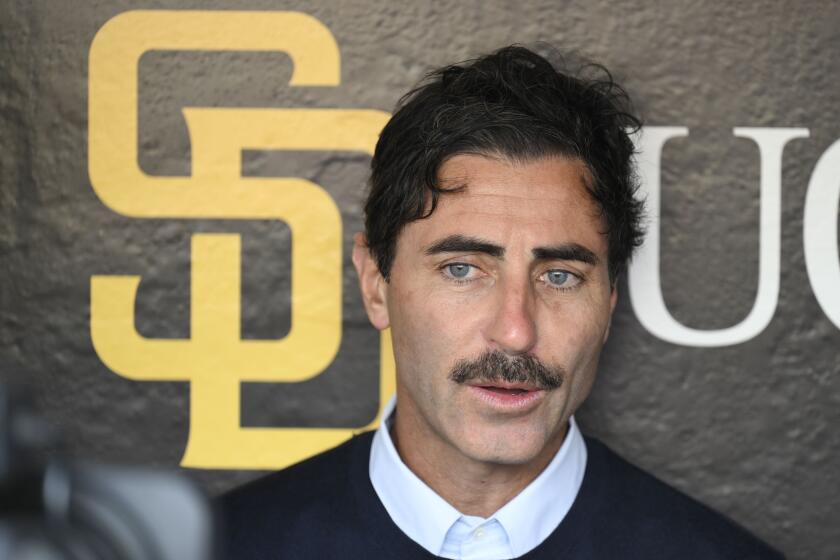Column: For Olympic runner Montano, the chance for good to prevail is closer after Russian track probe

Alysia Johnson Montano leads Janeth Busienei and Elena Arzhakova during an 800-meter semifinal at the London Olympic Games on Aug., 2012.
Someday, when Linnea Montano asks why there are no photographs of her mother waving to a huge crowd while accepting a bronze medal for her performance in the women’s 800-meter track race at the 2012 London Olympics, Alysia Johnson Montano knows exactly what she will tell her daughter, who is now 14 months old.
“When she does understand what all of this means and what mamma’s medals are and how I received them, I hope that she’s able to gather that doing things the right way and going after self-betterment in an honest way, with integrity, is more important than breaking rules and doing things illegally, especially things that will affect other people’s lives,” said Montano, who grew up in Santa Clarita and graduated from Canyon High School and UC Berkeley.
“I just want her to understand that good prevails at the end of the day.”
Good hasn’t prevailed yet. But Montano’s chances of rightfully getting that bronze medal in her hands rose dramatically this week, when an independent commission working for the World Anti-Doping Agency found a systematic and state-approved cover-up of the use of performance-enhancing drugs by Russian track and field athletes.
Among the report’s recommendations were that Russia be banned from future international track and field competitions and that five coaches and five middle-distance runners get lifetime doping bans — including two who finished ahead of Montano in the London Olympic final. The International Olympic Committee asked the International Assn. of Athletics Federations to initiate disciplinary procedures against those accused of doping, paving the way for the medals to be reallotted.
Montano, a six-time U.S. champion in the 800, suspected the Russians of doping before she finished fifth in London. Mariya Savinova of Russia crossed the line first and fellow Russian Ekaterina Poistogova third. “But suspicion is just suspicion until it’s proved. Even though you know,” Montano said in a telephone interview Wednesday.
“You just know. But if you say anything at the moment without having hard evidence, you look like a sore loser and you just can’t. And it eats at you internally, knowing that you’re fighting for your self-betterment, you’re fighting for your goals and your dreams, and someone is cheating you out of the opportunity of reaching your goals.”
Reading the report Monday triggered a flood of emotions and media interview requests for Montano, distracting her from building her training toward next summer’s Olympic trials. “The ultimate goal is to get another shot at a spot on the Olympic team and hopefully this time I’ll be able to race against clean athletes in the final of the Olympic Games,” she said.
“I feel like this is the perfect opportunity to speak out about it and basically yell at the top of my lungs. You feel freedom. You feel relief. You feel some sort of vindication. The full vindication isn’t quite there yet. We’re still looking for full justice, which is the return of the medals to their rightful owners and the financial losses to be rectified and those sorts of issues to be resolved.”
Taking a medal away and awarding it to the next-highest clean finisher can take a while, and it eliminates the immediacy and drama of post-event ceremonies.
U.S. shot putter Adam Nelson — elevated from 2004 silver medalist to gold after Yuriy Bilonog of Ukraine tested positive for performance-enhancing drugs — exchanged his old medal for his new one at an Atlanta airport food court in 2013. “I now know what it feels like to win a lifetime achievement award posthumously,” he said afterward.
Montano, who also stands to move up from third to second at the 2010 world indoor championships and get bronze medals from the 2011 and 2013 competitions, knows she can’t recapture the exhilaration or the endorsements she might have gotten had the cheaters not been allowed to compete.
“But what we can gain from it is the solidarity and support from one another and just recognizing that this is an issue that we can eradicate, that we can clean up,” she said. “Hopefully we can see, at the end of the day, that we need to institute lifetime bans for athletes that choose to cheat.”
Someday, when she gets that bronze medal she unquestionably deserves, she can tell Linnea about the tribute she received this week from fellow athletes, including some who might advance in world and Olympic results because of doping investigations. Many took to Twitter and used the hashtag #flyingflower alongside images of themselves wearing a flower in their hair, copying Montano’s trademark.
“It’s been incredible. It just lets you know on a massive scale how many athletes are clean and we’re having our sport tainted with the dirty athletes because they’re the ones taking the medals from the clean athletes,” Montano said. “The support has been so incredibly moving and I’m so thankful for that.”
Twitter: @helenenothelen
More to Read
Go beyond the scoreboard
Get the latest on L.A.'s teams in the daily Sports Report newsletter.
You may occasionally receive promotional content from the Los Angeles Times.










